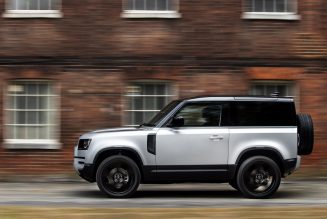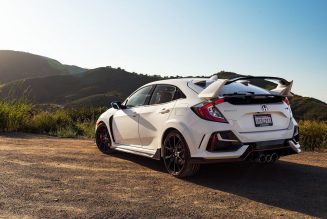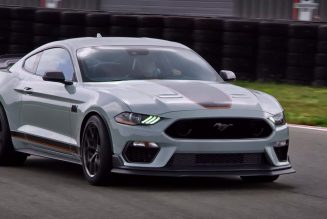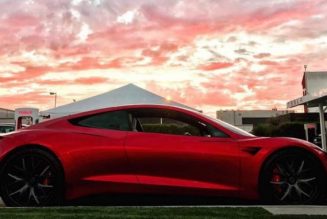Remember sedans? They’re not dead yet, though you’d be forgiven for thinking so considering what’s parked on your street. With more people making the switch to SUVs every year, some automakers have given up on sedans entirely. Hyundai isn’t one of them, and it’s betting that making the 2020 Hyundai Sonata sexy, comfortable, and effortless will convince you not to defect.
The way Hyundai tells it, the last Sonata was great but dull. This is, Hyundai says, because they were chasing best- in-class interior space at the expense of design. Believe that if you want, but now they say that’s not enough. SUVs of equal footprint have more space by nature, so they need something else to pull you in. The new strategy embraces the fact that a car purchase is more often an emotional one than a coldly logical one by playing to your heart. Ideally, they’ll hook your right brain with sleek, standout design and a comfortable, easy driving experience, then reel in your left brain with a laundry list of standard and optional features at an aggressive price point.
Solid strategy by the sound of it, but does the car deliver? You bet it does.


Design is purely subjective, but love it or not, it’s hard to deny the Sonata looks more conventionally attractive than the Accord, Camry, or Altima. Even if it’s not your flavor, you have to respect Hyundai for pulling no punches. This car stands out, and that alone is attractive.
A key piece of design is the sloping roofline, which emphasizes a sedan’s best attributes by making the car look low and sleek. Thankfully, careful packaging and seat design have mitigated the impact to rear head room, clipping it by just two-tenths of an inch. As such, Hyundai can’t claim best in class space anymore, but it’s still plenty comfortable for a 5’9” adult with a long torso.
The design-forward strategy plays out a little differently inside by emphasizing simplicity and cleanliness, but not at the expense of ergonomics. All the controls and screens are easy to read and manipulate, which allows you to keep your eyes on the road and not worry about finding features buried in menus. Hyundai’s infotainment software continues to be a benchmark for ease of use while the optional digital instrument cluster brings a little flair with sharp animations as you change screens and driving modes.


Funny thing is, the Sonata is so smooth and effortless to drive, you’d have plenty of time to dig through a complicated system. Get out on the highway, and the car feels so planted and stable you just want to set the cruise control to 90 mph for a few hours and see where you end up. Long, sweeping turns are handled like luxury sedans, leaning in and powering through instead of slowing down and taking it easy. Sharp corners, too, are dispatched easily and confidently, though treated more as a trifle than an opportunity for squealing tires. If you want a sport sedan, there’s a Sonata N-Line for that. This car is about getting the job done. Despite this, it also manages to ride quite smoothly and comfortably.
All the other components complement the drive as well. The new 1.6-liter Smartstream turbocharged I-4 makes slightly more peak power and gets an extra mile to the gallon both in the city and on the highway, but the story is in the delivery. At an estimated 8.2 seconds to reach 60 mph, it’s not especially quick in its segment, but the rich, linear power delivery and clever new eight-speed automatic transmission make the car feel quicker and more powerful than it is. Put your foot down, and the car sweeps up to speed and merges onto the interstate with ease. This engine is available on mid- to high-trim levels, and a substantially upgraded 2.5-liter I-4 is standard, but we didn’t have an opportunity to drive one of those.
Likewise, the responses from the brake pedal and steering wheel feel perfectly weighted and matched to the car’s personality. Nothing is too sensitive or too loose; it all responds in the same measured way that makes every input feel consistent. Nothing stands out because everything is equally good.
Then there are the party tricks. The Sonata comes loaded with standard safety features, as is expected these days, but it doubles down with luxury car features. A more sophisticated BlueLink smartphone app can now: preload your profile when you get in the car and change all your presets; remotely control some vehicle systems; act as a digital key to the car or be delegated to someone else who needs to drive your car; and remotely start the engine and pull the car into or out of a tight parking space for easier access.
Whether it’s the tech, the style, the $24,330 starting price, or the far pricier way it drives, Hyundai has given you every possible reason to stick with the sedan instead of defecting to an SUV. Whether that’ll be enough remains to be seen, but don’t bet against it.
| 2020 Hyundai Sonata | |
| BASE PRICE | $24,330 |
| VEHICLE LAYOUT | Front-engine, FWD, 5-pass, 4-door sedan |
| ENGINES | 2.5L/191-hp/181-lb-ft DOHC 16-valve I-4; 1.6L/180-hp/195-lb-ft turbocharged DOHC 16-valve I-4 |
| TRANSMISSION | 8-speed automatic |
| CURB WEIGHT | 3150-3350 lb (mfr) |
| WHEELBASE | 111.8 in |
| LENGTH X WIDTH X HEIGHT | 192.9 x 73.2 x 56.9 in |
| 0-60 MPH | 8.2 sec (mfr est) |
| EPA CITY/HWY/COMB FUEL ECON | 27-28/36-38/31-32 mpg |
| ENERGY CONSUMPTION, CITY/HWY | 120-125/89-94 kW-hrs/100 miles |
| CO2 EMISSIONS, COMB | 0.61-0.64 lb/mile |
| ON SALE IN U.S. | Currently |
The post 2020 Hyundai Sonata Review: Appealing to Your Emotions appeared first on MotorTrend.









